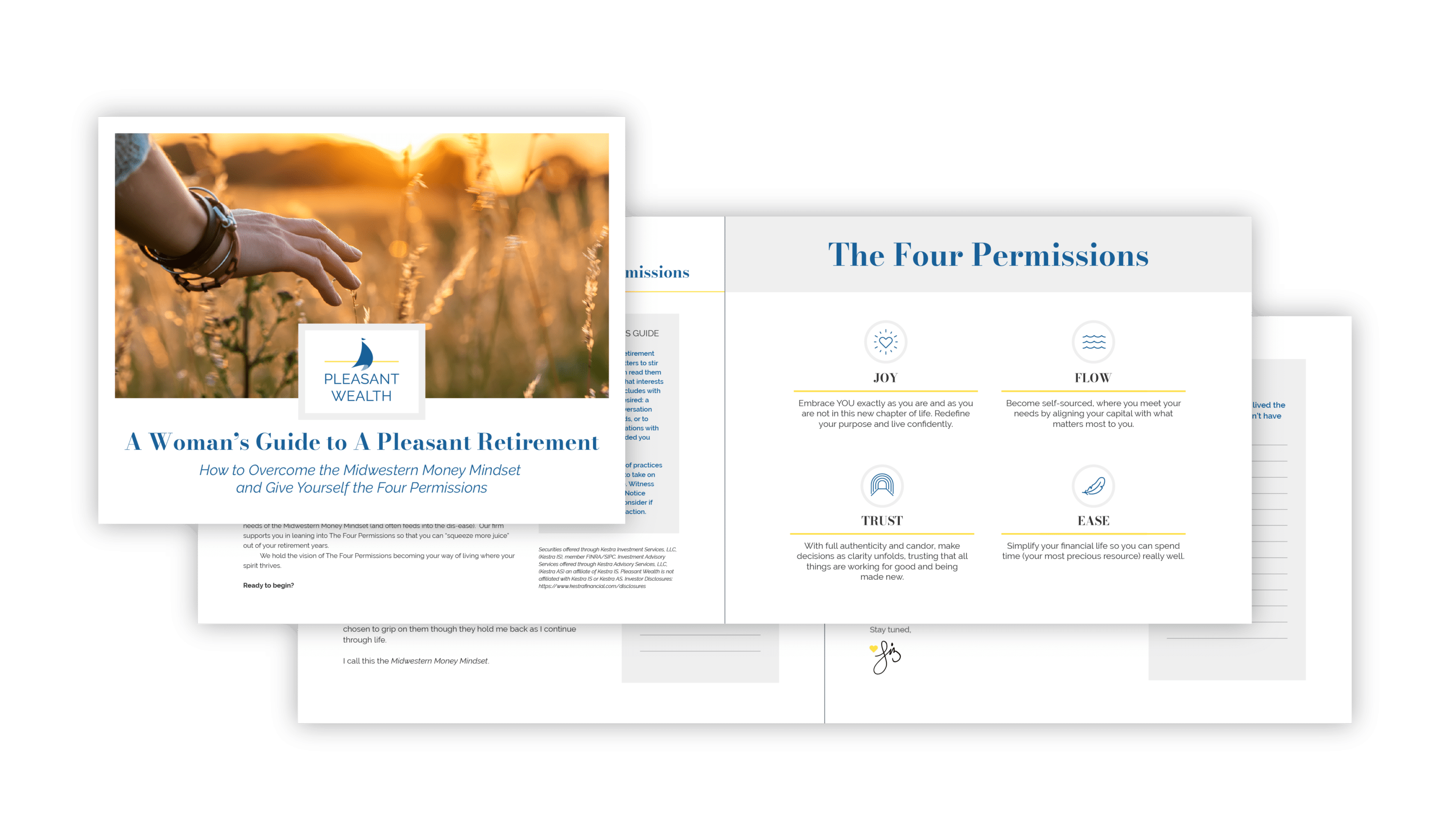Don’t go without downloading our free retirement guide!
A Woman’s Guide to a Pleasant Retirement
How to Overcome the Midwestern Money Mindset and Give Yourself the Four Permissions

Check the background of this firm on FINRA’s BrokerCheck →
Getting clear on cash flow is key to feeling confident about money, which is why over 74% of Americans have a monthly budget. Over your career, you’ve probably gotten comfortable setting a sensible budget that keeps you on track.
But budgeting in retirement can throw people off balance because so many things are changing all at once.
Here are five areas to think about as you approach budgeting in retirement to get confident about your cashflow.
For the most part, your income in retirement won’t be related to your work anymore. Your money will just feel different.
That different feeling is tied to the fact that retirement income is more indirect. What do I mean by that? Well, your income in retirement isn’t tied to a current activity or current productivity. You don’t see the same two weeks of work to two weeks of pay connection. “Hey, I just did all of this stuff, so now I get paid!” You just get the money. Yes, you put in the work for decades to earn it. However, it can be a difficult mindset shift for some of our clients to receive a paycheck despite not actively doing anything.
Along with that, you probably won’t be saving from your paychecks. And you could likely make life decisions that don’t optimize for financial efficiency, but you’ll still be ok.
When assessing your retirement income, you’ll first want to identify fixed income sources like Social Security or pension income.
From there, you can add your variable sources of income. Part-time work, business income, required distributions from retirement accounts like your Roth IRA or traditional IRA, and regular investment draws can supplement your fixed income.
An advisor can help you understand Social Security, estimate your other income, and plan for inflation so you don’t take too much income from investments.
Your lifestyle in retirement will change, and so will your spending. Consider your travel habits, work expenses, home maintenance, entertainment, charitable giving, and dining out.
Separate large, one-time expenses like a new home, renovations, or a once-in-a-lifetime trip. These should be part of your financial plan, but not part of your monthly cash flow planning.
Your taxes will likely change in retirement too! Work with an advisor who can help estimate these costs each year.
As you age, it’s a fact of life that your medical expenses will very likely increase in your retirement years. Unless you’re in impeccable physical shape, many people in retirement visit the doctor more frequently than they did in their working years,and so, their medical expenses increase.
If you retire before you’re eligible for Medicare, then you’ll have to figure out a stop-gap solution for health insurance. Some are fortunate enough that their employer covers their insurance before they age into Medicare. If you retire early, having a plan for health insurance and medical expenses is vital. We all know how quickly healthcare expenses can accumulate.
In a study from Boston College about medical expenses in retirement, 50% of the study’s participants spent more than $4,300 on medical expenses in one year in 2018. With the standard Medicare Part B monthly premium now at almost $175 for 2024, you could spend more than $2,000 on your premium cost alone in a year, not to mention other medical expenses not covered. A separate study from Fidelity showed that the average retired couple at age 65 would need an average of $315,000 saved for medical expenses in retirement. And that’s just the average.
Once you’re eligible for Medicare, it’s not as straightforward as you may expect. Medicare can be complicated, so work with someone who can explain your options in a way you understand. It pays to shop around, depending on the type of plan you select.
You’re looking for neutral cash flow. For people used to saving diligently, this can be a tricky mindset shift!
If cash flow is negative, you’ll either need to adjust your expenses or find additional income.
If it’s positive, congratulations! You have more options in your retirement budget to live and give!
Budgeting in retirement doesn’t have to be as difficult as it may feel. We hope this guide gives you a good starting point for your financial planning.
We talk with clients every day to create clear, confident financial plans. If you’d like a one-on-one conversation about your retirement budget or how to begin thinking about one, schedule an introductory call here.

Clinton Miller, CFP®, is an investment advisor & financial planner with an educational background in mathematics. He enjoys making tax planning relevant for clients so they can make confident money decisions.
He and his wife Aubrey are based in Canton, OH & have two sons. In his spare time, he enjoys fishing, chainsaw repair, & mucking around in the woods.